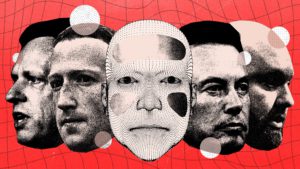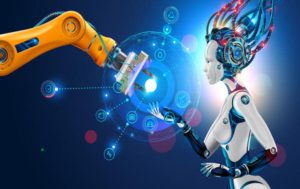Billionaire technocrats are creating an alternative, autocratic reality
“On the list of books to read this year: The End of Reality: How Four Billionaires Are Selling a Fantasy Future of the Metaverse, Mars, and Cryptocurrencies. Author Jonathan Taplin strikes the hammer to pin down technocracy and transhumanism to the main players: Peter Thiel, Elon Musk, Mark Zuckerberg and Marc Andreessen. These billionaires represent the tip of the spear.” – TN Editor

Four very powerful billionaires – Peter Thiel, Elon Musk, Mark Zuckerberg and Marc Andreessen – are creating a world where “nothing is real and everything is spectacle.” If we’re wondering how we got to a place of radical income inequality, a post-truth reality and the looming potential for a second American Civil War, we need look no further than these four, “the biggest wallets,” to paraphrase historian Timothy Snyder, “those who pay for the most dazzling lights.”
I call them the Technocrats, in recognition of the influence of the Technocracy movement founded in the 1930s by Elon Musk’s grandfather, Joshua Haldeman. The technocrats form a kind of interlocking Silicon Valley board of directors, each investing in each other’s companies or sitting on their boards. Their vast digital domain controls your personal information, influences the way billions of people live, work and love, and wreaks havoc online by inciting mob violence and driving up stock prices. These four men have long been viewed as technologically advanced heroes, but in reality they are part of a broader anti-democratic, authoritarian shift in the tech world that is deeply committed to preserving the status quo and its market-leading positions or near-monopolies – and their billion-dollar assets – to protect them from higher taxes. (“Competition is for idiots,” Thiel once claimed.)
In effect, they are American oligarchs who control online access for billions of users on Facebook, Twitter, Threads, Instagram and WhatsApp, including 80 percent of the US population. Furthermore, from the outside, they seem more interested in replacing our current reality – and our economic system, imperfect as it may be – with something far more opaque, focused and irresponsible, which they will control when it comes to pass.
I use the term “technodeterminism” to describe the path that the technocrats have dictated to our country (U.S.) because they sold us the idea that they would give us a bright future, and we bought it. However, the future they are selling us now – crypto fortunes, the merging of humans and computers through AI, the prospect of living out our lives in the Metaverse or on Mars – is a lie. To quote Snyder again, they “lied not so much to deny the truth as to invite people into an alternative reality.” Such sleight of hand also applies here. The alternative reality that these men are focused on is a world of technodeterminism, a world in which artificial intelligence will do all the work and large numbers of people could become useless to society.
The technocrats have made no secret of the fact that they plan to borrow from the government to finance some of their outrageous plans. Your plan for your future involves nothing less than confronting the nihilism of an impending dystopia. And four of the projects they are pursuing to realize their visions will require tens of trillions of dollars in (mostly public) investment capital over the next two decades. The first project backed by Andreessen, Thiel and Zuckerberg is Web3, a virtual world (the Metaverse) accessible through virtual reality (VR) headgear. Despite all the benefits it promises, it could end up turning the free web into an online amusement park where every door can only be opened with a crypto token. The second project is cryptocurrency support. Adam Fischer, Israel’s leading venture capitalist, has pointed out: “Crypto is not so much an investment idea consistent with libertarian political ideology, but a virulent form of libertarian political ideology that exploits human greed through blockchain.” The third project is supporting Elon Musk’s $10 trillion dream of sending people to Mars.
But of all the myths that the technocrats peddle, none is as far-fetched as transhumanism, a concept that is close to Peter Thiel’s heart. To understand what could be Big Tech’s biggest lie, one needs to dive deep into this social movement focused on research and development of “human-enhancing technologies” that could one day enable people to be 160 years or older. Needless to say, access to these age-extending systems, which have not yet been invented, will be greatly expensive, so under this scheme the only people who will live well into their second century will likely be multimillionaires.
These four projects – the metaverse, the crypto economy, interplanetary colonization and transhumanism, not to mention artificial intelligence – pose an existential threat to the world, politically, economically and perhaps predominantly morally. The moral danger arises from the fact that all four projects represent the first steps toward realized transhumanism. Transhumanists believe that technological and biological improvements will allow humans to live multiple lifetimes, migrate to other planets, and fuse our brains with computers so that our personal consciousnesses can live forever. Web3 is the first step towards a wearable technological extension of the human. Life on Mars would require constant technological expansion. And transhumanism itself imagines a point at which man and machine merge into a new kind of cyborg. It is a movement that would undermine the core idea of political liberalism, namely equal rights for all. Instead, a person’s wealth would determine his or her future prospects. Transhumanism is, to quote the philosopher and political scientist Francis Fukuyama, “the world’s most dangerous idea.”
Transhumanism imagines a future in which artificial intelligence and robots, ruled by the technocrats, do most of the work and a significant portion of the population sits at home, living a fantasy life in the metaverse and living on a government-paid cryptographic basic income. You will have broadband bill and your Metacoin micropayments for all concerts and clubs you attend virtually. Anyone who thinks this is a dystopian fantasy should visit Amazon’s research and development facility to see the future of entire warehouses staffed by five humans and 5,000 robots.

When Peter Thiel was three years old, according to his biographer Max Chafkin, he asked his father Klaus what the fur rug on the living room floor of their apartment in the southwest African city of Swakopmund was all about. His father explained to him that he came from a dead cow. “Death comes to all animals and all people,” Klaus said to his son.
The thought of his own mortality is said to have frightened the young Thiel in a way from which, some believe, he never fully recovered. Since 2006 at the latest, he has invested millions in research to defeat death. Perhaps he was listening to computer scientist Ray Kurzweil prophesying the Singularity, the end of the human era and the beginning of a new kind of superintelligence that would continue to improve and advance technologically at an unimaginable pace.
Nick Bostrom, a philosopher at Oxford University and doyen of transhumanist studies, has written a book called Superintelligence in which he argues that we are approaching the point where machine intelligence will surpass human intelligence. Bostrom warns that this new superintelligence could displace humans as the predominant “life form” on Earth. This would mean that the quasi-human machines could improve their own intelligence much faster than their fully human inventors. The monster could easily turn against Dr. Turn Frankenstein. While Kurzweil is optimistic about this singularity, Bostrom (and others, including Musk, as he warned) believes we could be headed for an existential catastrophe.
I don’t think we need to wait for the singularity to see the moral downside of the transhumanist project: the idea that humans should overcome their current natural state and limitations through the use of technology. The reason is that any problems we have with social inequality today will be exponentially multiplied by the kind of biological enhancement that Thiel and others are seriously considering. If people resist or are denied improvement, in time they will subordinate themselves to the improved class. Jaron Lanier, an early pioneer of virtual reality (VR), makes an eloquent case for resistance to technological improvements and the singularity. “The reason we should believe in human agency and not technological determinism,” says Lanier, “is that we will then have an economy in which people earn their own way and invent their own lives.” Structuring a society in a way that does not emphasize personal human free thinking is, in practice, the same as denying people influence, dignity and self-determination.
All four technocrats can be described as libertarians. Libertarians would generally argue that if genetic or technological enhancement of humans is possible, humans should have the freedom to improve their intelligence, change their appearance, or extend their lifespan. But these improvements won’t come cheap, and once the elite have access to them, the die-hards will have to fight to acquire the necessary biological improvements to compete in the new rat race. The spectre of designer babies, which involve significant costs, would then become part of the normal costs of parenthood.
The gene editing tool CRISPR-Cas9, for example, has already been used in China to modify non-viable human embryos, ostensibly to see if this is possible. Applications have been submitted to regulatory authorities in the United Kingdom and the United States to experiment with this tool to remove mutated genes that could cause some serious, mostly exceptional, diseases. The history of technological advancement suggests that an ambitious scientist will do something that is feasible. So the day will come when the embryo that you and your spouse conceived in vitro will be tested for many characteristics and you might find a menu like this:
- Above-average risk of type 2 diabetes and colon cancer.
- Below average risk of asthma and autism.
- Dark eyes, light brown hair, male pattern baldness.
- 40 percent chance of scoring above the 50th percentile on the SAT tests (if the SAT tests have not been completely eliminated by then).
You would have to decide for yourself whether you want to change the genes of your embryo before implantation at a very high price.

Peter Thiel seems open to over-the-top strategies that could prolong his life. Thiel, 55, told an Inc. writer: “I study parabiosis. It’s a method where you put young blood into older mice and find that it has a massive rejuvenation effect.” (In 2017, Thiel denied that he had personally used such transfusions and said he had “done nothing of the sort.”) Thiel has also supported the Methuselah Foundation, which annually awards the Methuselah Mouse Prize, which goes to the research team that sets the record for the world oldest mouse sets up. A second prize will be awarded to the team that develops the best strategy for late rejuvenation of mice.
Absurd? Of course not. Extending the lifespan of organisms in the laboratory is a far cry from extending human life by many decades – or reversing the human aging process.
As Thiel ponders eternal life, the lifespan of many people on Earth is becoming shorter and shorter. And as the effects of climate change accelerate, it could get worse – fast. In his 2021 book A Natural History of the Future, Rob Dunn makes the frightening claim that as the planet warms, the same tropical pests that have plagued the Southern Hemisphere will become established in much of the southern United States, for example. They will carry “a complex mix of the dengue virus and the yellow fever virus, but also the viruses that cause chikungunya, Zika fever and Mayaro.” In the coming decades, people living in Mississippi, for example, could are dying sooner because tropical diseases are moving north – even though people like Thiel suggest we live to be around 200 years old. These impacts of climate change are solvable problems. But Thiel’s investments suggest he is more concerned with experiments aimed at the personal longevity than with efforts that could directly impact the lifespans of millions of his fellow citizens in the here and now.
In the Journal of Medical Ethics, Martien Pijnenburg and Carlo Leget try to find an answer to the ethical question of whether it makes sense to spend millions on research into life extension when so many people die at a young age: “With a view to a better society, in a globalized world like ours, the moral challenge is to expand our view of the common good to include the well-being of all people worldwide. This expansion inevitably raises the urgent question of whether we can morally afford to invest time and money in trying to extend our lives while ignoring the whole problem of unequal death.”
One of the men who coined the term transhumanism (alongside Julian Huxley) was the English cryptologist Irving John Good. He wrote in 1965: “Since the design of machines is one of those intellectual activities, an ultra-intelligent machine could design even better machines; then there would undoubtedly be an ‘intelligence explosion’ and human intelligence would be left far behind. So the first ultra-intelligent machine is the last invention that humans will ever have to make.” ChatGPT takes us in this direction.
This vision of the future is so at odds with my beliefs that to explain the divide I have to turn to the Greek philosopher Epicurus and his ideas about what constitutes a good and fulfilling life. Epicurus highlighted three elements:
- The company of good friends
- The freedom and autonomy to do meaningful work
- An “examined life” based on a core belief or philosophy
One could argue that the transhumanists who are developing the metaverse, generative AI, and life-extending technologies obviously don’t care if you achieve any of these goals. If your friends are other avatars whose true identities are concealed, you don’t have close friends. If you sit at home all day, wear your VR helmet (because your job has been taken over by an AI), and live on a basic government income, you have neither the freedom nor the autonomy to do meaningful work. If much of what you do relies on a virtual fantasy existence, you certainly don’t have a tested life. At the end of reality you have become a cyborg.
The apparent convergence of humans and computers raises many ethical questions that we as a society must grapple with. Until now, however, it has been left to researchers and companies to determine the ethical boundaries. The possibility of artificial general intelligence (AI) in the near future – the ability of an intelligent agent to understand or learn any intellectual task that a human is capable of – has raised concerns among many renowned scientists. None other than cosmologist Stephen Hawking spoke out in 2012: “Faced with a possible future with incalculable benefits and risks, experts are surely doing everything they can to achieve the best outcome, right? Incorrect. If a superior but malefic extraterrestrial civilization sent us a message and said, ‘We’ll be here in a few decades’, would we simply reply, ‘Fine, call us when you get here – we’ll keep the lights on’? Probably not – but that’s more or less what’s going on with the terrible threat of [artificial intelligence (AI)].”
AI analyst Eliezer Yudkowsky, co-founder of the Machine Intelligence Research Institute, has observed: “Many ambitious people find it far less frightening to think about destroying the world than to think that they will never get anywhere. All the people I have met believe that their AI projects will achieve eternal fame.”
Ord notes that in a 2018 survey of leading AI researchers, “half of respondents said the long-term impacts of artificial general intelligence (AGI) were ‘extremely bad’ (e.g., human extinction), estimated to be at least 5 percent.” How often do you find an area where a significant proportion of participants believe there is a one in 20 chance that their work will end life as we know it?
The men (and they are mostly men) who invent this world of machine superintelligence and biotechnology generally do not believe in God. But they want to be gods. As the writer and commentator GK Chesterton claimed in 1932: “The truth is that irreligion is the opium of the people. Wherever people do not believe in anything beyond the world, they will worship the world. But above all they will worship the strongest thing in the world.” Today, the strongest development in the world is large-scale technology. Unless we stop worshiping the temple of Saint Peter or Elon or Zuck or Marc, we will be trapped in the future they want.
Author: Patrick Wood
yogaesoteric
October 21, 2023
